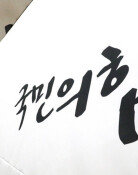Is feminism creating a surname revolution in Korea?
Is feminism creating a surname revolution in Korea?
Posted December. 28, 2010 10:02,
Ji-yoon, 21, who was elected the 53rd student president of Seoul National University early this month, a post which had remained empty for a year, does not use her family name.
Handwritten posters put in every corner of the universitys main campus over their campaign period listed just the personal names of the candidates for student president and vice president -- Ji-yoon and Doo-heon.
The surname itself is the product of patriarchy. Since Im interested in feminism, I use only my first name and not my surname in both private and public settings, Ji-yoon said.
Though her surname is Lee, she introduces herself with her first name when speaking as a student representative.
Doo-heon, 23, was influenced by his fathers emphasis on gender equality. After he attended a seminar on feminism, he said he decided not to use his surname.
Park Hye-kyung, a womens studies professor at Ewha Womans University, uses parentheses for the surnames of both of her parents like (Lee Park) Hye-kyung when she has to use her surname.
She uses Park, her mothers maiden name, because she is against jus sanguinis (right of blood) and support her maternal line. I use parentheses because I dont think a surname should be attached to my first name, she said. Since its not easy to use the first name only in established communities, artists often use first names only.
Certain feminists who had used the surnames of both parents now use their first name or one surname for both parents. For example, Kim Myung-shin, 54, a Seoul City Council member, introduced herself as Kim Jeong Myung-shin before the hoju (patriarchal family) system was abolished in 2008.
She used both her fathers and mothers surnames. I used both surnames as part of efforts to abolish the hoju system, she said. Since the hoju system was abolished and using both surnames can be inconvenient for others, I now use only one surname.
The new practice is not without challenges, however. Critics question whether a child should have four surnames and others say using the mothers surname goes back to the patriarchal origin.
Heo La-geum, professor of womens studies at Ewha, says she often sees students who do not use their surnames in her classes. In certain cases, people used the surnames of both parents to protest the patriarchal family system, but some criticized that using the surname itself is jus sanguinis, she said.
Since Korean culture has been heavily influenced by the Confucian practice of stressing blood ties, some are trying not to use their surnames as part of a cultural campaign.
minki@donga.com







